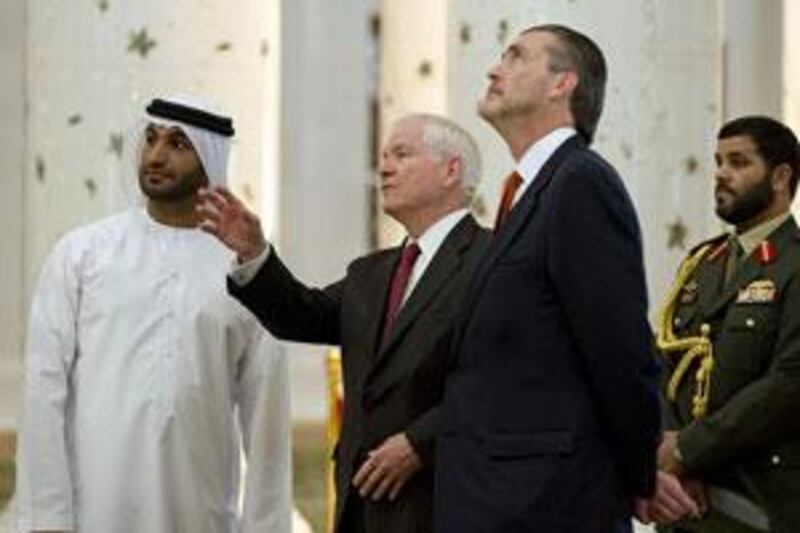ABU DHABI // Robert Gates, the US defence secretary, arrived in the capital yesterday on a diplomatic mission to persuade Gulf nations to ratchet up pressure on Iran over its nuclear programme. Yesterday afternoon Mr Gates met Sheikh Mohammed bin Zayed, the Crown Prince of Abu Dhabi and Deputy Supreme Commander of the Armed Forces.
US defence officials told reporters the aim of the trip was to win support for tougher sanctions against Iran and press Gulf leaders to bolster air and missile defences. During his meeting with the Crown Prince, the diplomat also pushed for measures to be taken against a number Iranian firms doing business in the UAE, a Pentagon official said. The two men also discussed the latest developments in the Middle East peace process and agreed on the need for better co-operation among countries in the region to maintain security and stability, according to WAM, the state news agency.
Mr Gates said there was a "deep and long-standing friendship" between the two countries as he took a tour of the Sheikh Zayed Mosque. "It is a beautiful site and a fitting tribute to the father of this nation, a man of great vision, tolerance and judgement," he said of the mosque. Mr Gates's visit, his first since 2007, came as Mahmoud Ahmadinejad, the Iranian president, warned of the presence of "bullying powers" in the region.
"The Iranian people will not allow corrupt world powers to create unrest in the Gulf," Mr Ahmadinejad said in an address from Bandar Abbas, broadcast on state television. "What are you doing in our region? If you think you can control the oil of Iraq and the Gulf, you are mistaken." There are more than 6,000 Iranian businesses in the UAE, and trade between the two countries topped US$15 billion (Dh55.05bn) in 2009, according to embassy officials in Abu Dhabi.
Mehdi Agha Jafari, the chargé d'affairs at the Iranian Embassy in Abu Dhabi, has said that he does not expect western efforts for tighter sanctions to have a detrimental effect on trade with the UAE. "In spite of the pressure from other countries, the value of trade is going up," he said in a recent interview. "The pressure isn't new." The US is leading an effort for the UN Security Council to introduce a new round of sanctions against Iran as concerns about its nuclear programme heighten.
However Russia and China, which both have the power to veto the proposal, are lobbying to continue the diplomatic track, something the US hopes support from the Gulf will counter. The defence secretary arrived from Saudi Arabia where he asked for King Abdullah's support in pressing the kingdom's Gulf neighbours to support tougher measures after Tehran "rebuffed" conciliatory efforts. The US hopes the arms build up in the Gulf will also send a clear message to Tehran. "It's not lost on the Iranians, all the security co-operation that's been going on for years now," said Geoff Morrell, the Pentagon press secretary.
lmorris@thenational.ae * With agencies






